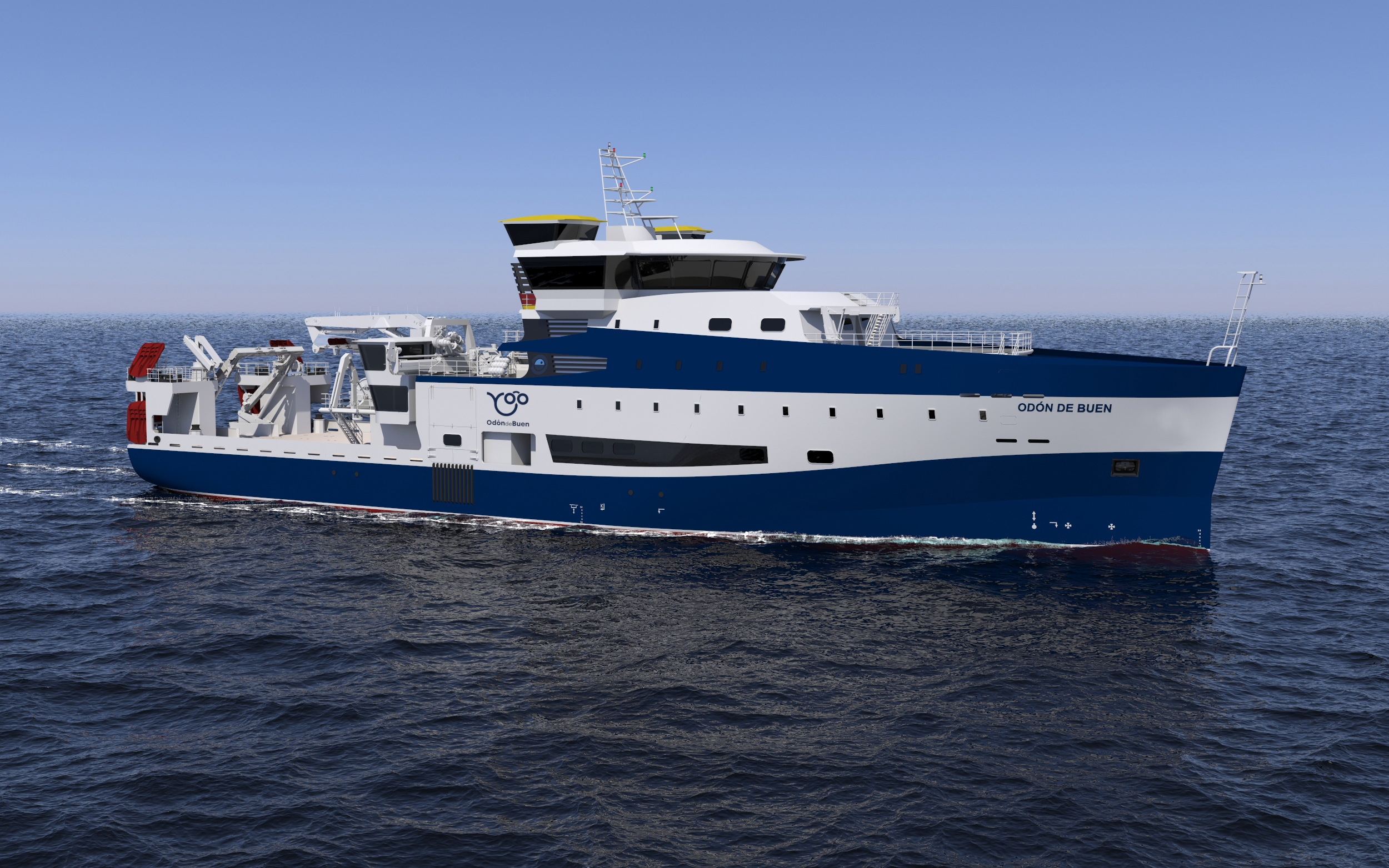- Ingeteam is to supply equipment including Indar electric motors and Ingedrive power converters for the Odón de Buen, a powerful vessel owned by the Spanish Oceanographic Institute which will commence operations in 2025.
- The company will be fitting the latest green propulsion technology for silent running with minimal C02 emissions, so assure the conservation of marine animals.
- Ingeteam thus confirms the leading role in the development of components for Spanish oceanographic vessels, for which it is one of the main suppliers.
Ingeteam's cutting-edge technology is to enable the immensity of the ocean floor to be observed close-up in a more sustainable fashion, thanks to the electrical equipment that the company is to supply to the Spanish Oceanographic Institute for the Odón de Buen, which is to be Spain's largest marine research vessel.
This highly specialised equipment features the latest technology in green propulsion, which will enable the Odón de Buen (named after the founder of the Spanish Oceanographic Institute) to run in complete silence. This is essential for ocean observation and working with scientific echo-sounders. The vessel also has low CO2 emissions to minimise its impact on and disturbance of marine organisms.
Ingeteam is currently manufacturing the Indar electric motors and Ingedrive power converters for the vessel's main and tunnel drive propulsion units. In all this means 2 motors and 6 power converters with different ratings, enabling gas emissions into the atmosphere to be reduced. The company is also to supply the propulsion control system for the vessel, which is designed to increase the efficiency of the main and auxiliary propulsion units.
The technological solutions developed by Ingeteam for this vessel will help to make it possible for the first time to study marine ecosystems, habitats and the ocean floor anywhere in the world, including the areas around the poles, at depths in excess of 6000 m. The vessel is to be 85 m long and 18 in width, with a range of 50 days. There will be room on board for a 500 m2 laboratory. Its cost is close to €85 million, and construction is under way at the Astilleros Armón shipyard in Vigo. The vessel is to come into service in 2025, in a further landmark in the solid links between the two companies as they seek to lead the worldwide oceanographic market. The Odon de Buen is to have a clearly global, multi-purpose remit. It will enable projects to be diversified in areas such as marine biology, geology and fishing, to name but a few.
Ingeteam is thus confirming the leading position in the design and development of innovative technological solutions for handling scientific instruments for detecting marine organisms, and in implementing silent running technologies for oceanographic vessels. The company is a pioneer in this field. It has become one of the main suppliers of components for the oceanographic vessels of the Spanish Oceanographic Institute. These components, which the Basque firm makes for low-noise motors, are fundamental in such vessels, as they emit the lowest possible level of vibrations so as to comply with specific regulations in the field and assure the preservation of the marine environment and ecosystem.

Ingeteam's recent contributions to the field of marine research include a sophisticated refit of the power converters and propulsion units of the Vizconde de Eza, a long-distance vessel with a track record of over 100 campaigns. The company also fitted a dynamic positioning system that enables the vessel to hold its position and thus take more precise observations even in poor weather.
At international level, Ingeteam has participated in projects such as the Norwegian vessel Dr. Fridtjof Nansen, which features an electrical propulsion system that is considerably more efficient than conventional diesel units. It is also highly reliable, as each electro motor is powered by its own converter and the layout of equipment is flexible, which facilitates maintenance and minimises environmental impact. Also stand out other vessels like REV, RV Tom Cream, RV Bélgica II, Baia Farta, CGS John Cabot, CCGS Captain Jacques Cartier, BIP Victor Angelescu, Bipo Inapesca and the RV Investigator.
In short, the idea is to place cutting-edge technology at the service of the scientific community so that scientists can see (and hear) more and further, and thus continue making discoveries in the inexhaustible biodiversity that can be found in the depths of the seas and oceans around the world.